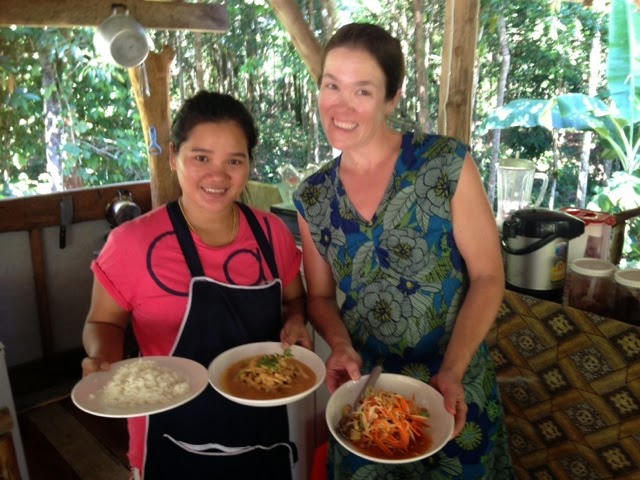We took a long 3-day trek to Khaptad National Park. Day 1 was 9.5 hours of mostly uphill, mountainous hiking. Day 2 was 8 hours of mostly uphill hike to a high grassy meadow with Himilayan views. Day 3, we intended to hike all the way down.
We made it to our lunch stop (our overnight from Day 1) in 5 hours. But shortly after lunch, our friend Bill took a nasty fall downhill into a creek bed. His head was bloody and he couldn't walk because of hip pain.
His wife Judy is an MD, his daughter Saanti is a wilderness first responder, and Forrest and I are EMTs... So he had a decent team at his disposal. We sent the Nepali that was with us back to the lunch village for help. Judy dressed his head wound and the 5 of us lift-carried him out of the creek. Forrest directed the building of a makeshift stretcher on the trail, but before we were ready, the Nepali, Arjun, had returned with 4 boys in flip flops and a cobweb covered stretcher probably left at the village by an NGO.
We secured Bill to the stretcher and the flip flip team lifted him onto their shoulders and took off at a pace we could hardly maintain. We figured we were 3-4 hours from the nearest road.
We raced up and down the mountain trails, along rice terraces, and thru creeks. At a particular steep river crossing, all the boys lost their flip flops as they scrambled up a muddy hill, Bill teetering on their shoulders. The flip flops were collected, rinsed, and they stepped back into them on the move.
We gave the boys our little bit of water and food on their few breaks. Bill hardly complained, though obviously in pain. We raced to keep up. It got dark. They went on.
We reached a friend by phone, who arranged a jeep waiting at the road. The flip flip ambulance made it there in 2 hours and 45 minutes. Bill was at the hospital in Balyapata, where we had started our hike 3 days earlier, 5 hours from injury-- a truly amazing feat for a fully stocked, state-of-the-art EMT squad, unbelievable for boys in flip flops.
Bill's X-Ray showed a severly fractured pelvis that needs immediate surgery.
They sent him and his family to Kathmandu by helicopter. Always the critical pilot, I was nervous for his flight, but the pilot that showed up was the one from "Into Thin Air"-- who rescued all those climbers off Mount Everest. He's the best mountain pilot in Nepal, and this country is the Capitol of mountain flying.
If he's half as good as the village boys in flip flops, Bill's in good hands.
Forrest is shopping for travel insurance.

















































